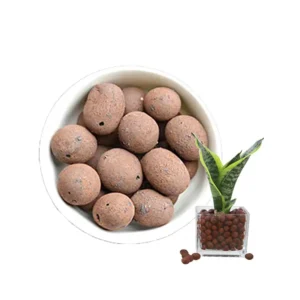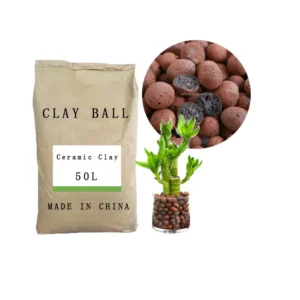In the world of gardening, Leca balls, also known as expanded clay pebbles, have gained significant popularity due to their unique properties and multiple benefits. These small, lightweight pebbles are revolutionizing the way gardeners approach plant cultivation.
Physical Characteristics
Leca balls are characterized by their porous and lightweight structure. Made from fired clay, they have a rough, textured surface filled with tiny holes. This porosity is a key feature that contributes to their functionality in gardening. Their light weight makes them easy to handle and transport, whether you’re setting up a small indoor garden or a large – scale outdoor landscape.

Water Retention and Drainage
One of the most important aspects of gardening is maintaining proper water balance. Leca balls excel in this area. They can absorb a large amount of water, acting like small reservoirs for plants. When the soil or growing medium dries out, the Leca balls release the stored water, ensuring a consistent water supply for the plants. At the same time, their porosity allows for excellent drainage, preventing waterlogging, which can be detrimental to plant roots.
Aeration for Root Growth
Healthy root growth requires adequate oxygen, and Leca balls provide just that. The spaces between the pebbles and their internal pores allow air to circulate freely around the roots. This promotes root respiration and helps the roots develop strong and healthy. In traditional gardening soils, compaction can reduce air availability, but Leca balls eliminate this problem.
Nutrient Absorption and Slow Release
Leca balls have a high cation – exchange capacity, which means they can absorb and hold onto nutrients effectively. When fertilizers are added to the growing medium, the Leca balls take in these nutrients and release them slowly over time. This provides a steady and continuous source of nourishment for the plants, promoting healthy growth and development.
Applications in Different Gardening Setups
Leca balls are versatile and can be used in various gardening setups. In hydroponic systems, they serve as an excellent growing medium, providing support for plants while facilitating water and nutrient uptake. In traditional potted plants, they can be mixed with soil to improve its structure, water – holding capacity, and aeration. They are also great for use in terrariums and vertical gardens.

Cost – effectiveness
Despite their numerous benefits, Leca balls are a cost – effective option for gardeners. They are reusable, which means you can clean and sterilize them after each growing season and use them again. This reduces the long – term cost of gardening, especially for those who have large gardens or engage in commercial gardening.
Environmental Friendliness
Made from natural clay, an abundant and renewable resource, Leca balls are an environmentally friendly choice. Their production process is relatively energy – efficient compared to some synthetic gardening materials. Additionally, they do not release harmful chemicals into the environment, making them a sustainable option for eco – conscious gardeners.
Market Trends and Availability
In recent years, the demand for Leca balls in the gardening market has been steadily increasing. More and more garden centers and online retailers are stocking these products, making them easily accessible to consumers. There are also ongoing research and development efforts to improve their performance and expand their applications.
Tips for Using Leca Balls in Gardening
Before using Leca balls, it’s important to rinse them thoroughly to remove any dust or debris. When using them in hydroponics, make sure to adjust the nutrient solution concentration according to the specific needs of your plants. In potted plants, mix them with soil in the right proportion to achieve the best results.
In conclusion, Leca balls, or expanded clay pebbles, are a game – changer in the world of gardening. Their unique physical and chemical properties, cost – effectiveness, and environmental friendliness make them a top choice for both amateur and professional gardeners.

